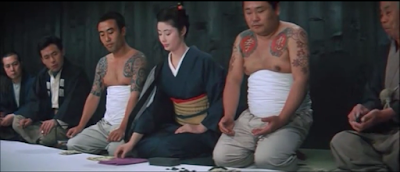Junko Fuji starred as Oryu, the Red Peony, in a series of eight films from the Toei Studio from 1967 to 1971. These are romanticized yakuza films of the sort that might have made Kinji Fukasaku vomit in his mouth. At the least, they make a distinction between good yakuza, the sort who run honest gambling parlors, and the less savory sort who, as in this second installment, prey on ordinary people through loan sharking and running sweatshops. The setting is the "Middle Meiji period," approximately the turn of the 20th century, so that characters use pistols, telephones and other nearly modern devices and a contrast can be drawn between people who go too modern, like this film's big-bad who goes back and forth between Japanese and western dress, and characters like Oryu who, despite her pistol, embody traditional values in their dress and demeanor.Oryu is a yakuza and, in theory at least, the oyabun of a clan inherited from her father, but unlike some women of the milieu, she doesn't flaunt her outlaw identity but dresses and behaves modestly, until forced into violent action. She can shoot, stab, slash and do judo throws like a champion, but while she travels around learning the gambler's trade and the ways of honorable yakuza, she remains somewhat ashamed of her vocation. She doesn't show off her yakuza tattoos, and only displays them to a female friend in this picture in order to warn her, in effect, "Don't end up like me." Badass Oryu may be, but like many wandering heroes of Japanese cinema, her life often seems like a curse, or at least an unhappy destiny.
Gambler's Obligation is helmed by cult director Norifumi Suzuki, who gives the proceedings plenty of widescreen panache. Oryu's having a good time as the film starts, working for the benign oyabun Togazaki and merrily banging a festival drum as the opening credits roll. A skilled gambler, she's able to shut down the winning streak of Oren (Mari Shiraki), a tattoo-flaunting women who recurs through the picture as a road-not-taken version of Oryu herself. Togazaki sends Oryu away for her own good when he decides to deal with his wicked rival Kasamatsu, which allows this sequel to reintroduce the comedy-relief yakuza clan from the first film, headed by Tomisaburo Wakayama. When Togazaki the elder is killed in the battle, Oryu returns to help the old man's son and daughter-in-law hold on to their businesses as Kasamatsu, backed by the quietly menacing Shiraishi (Bunta Sugawara), muscles in. Acquiring her own little band of followers along the way, Oryu travels to Tokyo to plead the Togazaki cause with a yakuza conclave, but the tide seems to be flowing inexorably against them.
This film does a good job establishing Kasamatsu as a real scumbag villain. He invites Oryu to decide the Togazakis' future in a dice game, with Oren as his proxy, whom he forces to cheat. Naturally, Oryu catches her at it, and Kasamatsu has the hapless woman beaten viciously for it. Then he does some additional cheating, convincing Togazaki's wife that her husband, whose liberation from prison has already been arranged by Oryu, can only be freed by her signing away the family carriage business -- and submitting to rape. She ends up disgraced, and poor Togazaki ends up getting killed after everything everyone's done for him. That only means it's time for Oryu to settle accounts with all the bad guys.
While the Japanese clearly liked badass fighting heroines before they really became a thing in the U.S., Gambler's Obligation doesn't quite go as far as fans might expect or hope. Everything seemed to point toward a battle between Oryu and the Bunta Sugawara character, but the way things actually play out makes you suspect that someone at Toei didn't think audiences would buy Junko Fuji beating Bunta in a fight. Instead, they bring in Koji Tsuruta in a glorified cameo as a good-guy interloper with his own reasons for fighting Kasamtasu. He gets to kill Bunta, while he and Fuji share in finishing off Kasamatsu before a random enemy blows him away, since Oryu does need to be the last person standing when the smoke clears. Despite this disappointment, Fuji certainly more than holds up her end of the action while lending her character the swan-necked dignity and superficial stoicism Oryu requires.
This first sequel ends on a sad note as Oryu returns to the site of the opening-credits festival. Many of her fellow celebrants are dead now, and it's a lonely climb to the tower where she beat the drum so happily before. Now she beats it again in mourning for all the friends she's lost, if not also for the hope for a normal life that seems just a little more lost now. Earlier, the Tsuruta character had explained to her the history of her rival Oren and her lover. They seem to lead a miserable life, but Tsuruta observes, almost with a note of envy, that they'll never leave each other. If in some ways Oren seems like an Oryu gone wrong, the film suggests that, despite all Oren suffers, she has something Oryu doesn't and may never have. There are many films to go in this series, but I doubt that this will change.






No comments:
Post a Comment